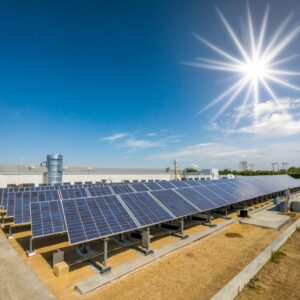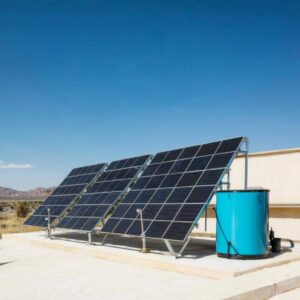
Hello readers, welcome to today’s article on the power of solar energy. In this piece, I will explore the key benefits of solar energy and the promising future it holds. Solar energy is a renewable and clean source of power that harnesses the energy from the sun to generate electricity. It is a game-changer in the quest for sustainable energy solutions.
Solar panels, also known as photovoltaic (PV) cells, capture sunlight and convert it into electricity through the photovoltaic effect. Unlike traditional energy sources, solar energy produces no harmful emissions or pollution, making it one of the cleanest forms of energy available.
The benefits of solar energy are immense. By embracing solar power, we can reduce our reliance on fossil fuels, lower electricity costs, and contribute to a greener and more sustainable future. According to the U.S. Department of Energy, solar energy has the potential to power millions of homes and businesses across the country.
In 2020, solar energy accounted for nearly 3% of the total electricity generation in the United States. The solar industry has experienced remarkable growth, with a significant increase in installations and job creation. The declining cost of solar panels has made solar energy more accessible and affordable for consumers.
The future of solar energy looks promising. Advancements in technology and increased investment in renewable energy initiatives are driving the development of more efficient and effective solar systems. Many states and cities in the U.S. have set ambitious goals to increase the use of solar energy and transition to a clean energy economy.
Key Takeaways:
- Solar energy is a renewable and clean source of power.
- Solar panels convert sunlight into electricity with no harmful emissions.
- Solar energy reduces reliance on fossil fuels and lowers electricity costs.
- The solar industry is experiencing rapid growth and job creation.
- The future of solar energy is promising, with advancements in technology and increased investment.
The Benefits of Solar Energy
Solar energy is a clean source of energy that offers numerous benefits for both the environment and consumers. By harnessing the power of the sun, we can reduce our dependence on finite fossil fuels and contribute to a greener, more sustainable future.
- Solar energy is a renewable energy source that does not produce greenhouse gas emissions or contribute to air pollution, making it a clean and environmentally friendly choice.
- One of the key advantages of solar power installations is the potential for cost savings on electricity bills. By generating your own electricity, you can reduce or eliminate your reliance on traditional grid power.
- With the implementation of net metering programs, excess energy generated by solar panels can be fed back into the grid, allowing you to earn credits or further reduce your energy costs.
- Solar energy systems require minimal maintenance and have a long lifespan, typically lasting 25 to 30 years. This longevity provides long-term cost savings compared to other energy sources.
- Investing in solar energy also creates job opportunities and stimulates economic growth in the clean energy sector. As the solar industry continues to expand, so does the demand for skilled professionals.
- Solar panels can be installed on various types of buildings, including residential homes, commercial buildings, and large-scale solar farms. This versatility allows solar energy to be accessible to a wide range of consumers.
- In addition, solar energy can provide electricity to remote and off-grid areas where traditional electricity infrastructure may not be available or cost-effective. It enables these areas to access clean energy and reduces their reliance on imported energy sources.

The use of solar energy offers numerous benefits, from contributing to a cleaner environment to providing cost savings for consumers. As technology continues to advance and the costs of solar panels decrease, we can expect to see even greater adoption of solar energy in the future.
The Future of Solar Energy in the United States
The solar industry in the United States has been experiencing significant growth in recent years, with an increasing number of solar installations and jobs created. According to the Solar Energy Industries Association, the solar industry added an estimated 231,474 jobs in 2020, despite the challenges posed by the COVID-19 pandemic.
The federal government and many states have implemented policies and incentives to support the growth of the solar industry. Initiatives such as the Investment Tax Credit (ITC) and Renewable Portfolio Standards (RPS) have provided financial support and regulatory certainty. As a result, the United States installed a record-breaking 19.2 gigawatts (GW) of solar capacity in 2020, enough to power 3.6 million homes.
The Biden administration’s ambitious clean energy goals are expected to drive further investments in solar energy. With a target of achieving 100% clean electricity by 2035 and net-zero emissions by 2050, there will be a strong focus on transitioning to renewable energy sources such as solar power. This commitment from the government will create new opportunities for solar industry growth.
The falling costs of solar panels, advancements in technology, and increased public awareness and acceptance of renewable energy are additional factors fueling the growth of the solar industry. As solar becomes more cost-effective and accessible to individuals and businesses, there is potential for even greater expansion. Large-scale solar farms and solar-powered community projects are emerging as viable options to maximize the benefits of solar energy.
The transition to a renewable energy future, with the widespread adoption of solar power, plays a crucial role in mitigating climate change and creating a sustainable future for generations to come. As the solar industry continues to grow and evolve, it will contribute to a cleaner and more resilient energy system, reducing dependence on fossil fuels and driving the clean energy transition.
FAQ
What is solar energy?
Solar energy is a renewable source of power that harnesses the energy from the sun to generate electricity. It is considered one of the cleanest forms of energy as it produces no harmful emissions or pollution.
How do solar panels work?
Solar panels, also known as photovoltaic (PV) cells, convert sunlight into electricity through the photovoltaic effect. When sunlight hits the solar panels, it creates an electric current that can be used to power homes, businesses, and other electrical devices.
What are the benefits of solar energy?
There are numerous benefits of solar energy. It reduces reliance on fossil fuels, lowers electricity costs, and contributes to a greener and more sustainable future. Additionally, solar energy does not produce any greenhouse gas emissions or contribute to air pollution.
Can solar energy save me money?
Yes, solar power installations have the potential to save homeowners and businesses money on their electricity bills. With net metering programs, excess energy generated by solar panels can be fed back into the grid, potentially earning credits or reducing overall energy costs.
How long do solar panels last?
Solar panels typically have a lifespan of 25 to 30 years, providing long-term cost savings. They also require minimal maintenance, making them a reliable and durable source of clean energy.
Can solar energy create job opportunities?
Yes, the use of solar energy can create job opportunities and stimulate economic growth in the clean energy sector. The solar industry has been experiencing significant growth in recent years, with an increasing number of solar installations and jobs being created.
Where can solar panels be installed?
Solar panels can be installed on various types of buildings, including residential homes, commercial buildings, and large-scale solar farms. They can also provide electricity in remote and off-grid areas where traditional electricity infrastructure may not be available or cost-effective.
How does the solar industry contribute to the US economy?
The solar industry has been contributing to the US economy by creating jobs and driving economic growth. Despite the challenges posed by the COVID-19 pandemic, it added an estimated 231,474 jobs in 2020. The federal government and many states have implemented policies and incentives to support the growth of the solar industry, further boosting its economic impact.
What is the future of solar energy in the United States?
The future of solar energy in the United States looks promising. With advancements in technology and increased investment in renewable energy initiatives, the solar industry is expected to continue growing. Many states and cities have set ambitious goals to increase the use of solar energy and transition towards a clean energy economy.








